- Region
- Águilas
- Alhama de Murcia
- Jumilla
- Lorca
- Los Alcázares
- Mazarrón
- San Javier
-
ALL AREAS & TOWNS
- AREAS
- SOUTH WEST
- MAR MENOR
- MURCIA CITY & CENTRAL
- NORTH & NORTH WEST
- TOWNS
- Abanilla
- Abarán
- Aguilas
- Alamillo
- Alcantarilla
- Aledo
- Alhama de Murcia
- Archena
- Balsicas
- Blanca
- Bolnuevo
- Bullas
- Cañadas del Romero
- Cabo de Palos
- Calasparra
- Camping Bolnuevo
- Campo De Ricote
- Camposol
- Canada De La Lena
- Caravaca de la Cruz
- Cartagena
- Cehegin
- Ceuti
- Cieza
- Condado de Alhama
- Corvera
- Costa Cálida
- Cuevas De Almanzora
- Cuevas de Reyllo
- El Carmoli
- El Mojon
- El Molino (Puerto Lumbreras)
- El Pareton / Cantareros
- El Raso
- El Valle Golf Resort
- Fortuna
- Fuente Alamo
- Hacienda del Alamo Golf Resort
- Hacienda Riquelme Golf Resort
- Isla Plana
- Islas Menores & Mar de Cristal
- Jumilla
- La Azohia
- La Charca
- La Manga Club
- La Manga del Mar Menor
- La Pinilla
- La Puebla
- La Torre
- La Torre Golf Resort
- La Unión
- Las Palas
- Las Ramblas
- Las Ramblas Golf
- Las Torres de Cotillas
- Leiva
- Librilla
- Lo Pagan
- Lo Santiago
- Lorca
- Lorquí
- Los Alcázares
- Los Balcones
- Los Belones
- Los Canovas
- Los Nietos
- Los Perez (Tallante)
- Los Urrutias
- Los Ventorrillos
- Mar De Cristal
- Mar Menor
- Mar Menor Golf Resort
- Mazarrón
- Mazarrón Country Club
- Molina de Segura
- Moratalla
- Mula
- Murcia City
- Murcia Property
- Pareton
- Peraleja Golf Resort
- Perin
- Pilar de la Horadada
- Pinar de Campoverde
- Pinoso
- Playa Honda
- Playa Honda / Playa Paraíso
- Pliego
- Portmán
- Pozo Estrecho
- Puerto de Mazarrón
- Puerto Lumbreras
- Puntas De Calnegre
- Region of Murcia
- Ricote
- Roda Golf Resort
- Roldan
- Roldan and Lo Ferro
- San Javier
- San Pedro del Pinatar
- Santiago de la Ribera
- Sierra Espuña
- Sucina
- Tallante
- Terrazas de la Torre Golf Resort
- Torre Pacheco
- Totana
- What's On Weekly Bulletin
- Yecla


- EDITIONS:
 Spanish News Today
Spanish News Today
 Alicante Today
Alicante Today
 Andalucia Today
Andalucia Today
article_detail
Spanish News Today Editors Roundup Weekly Bulletin Nov 8
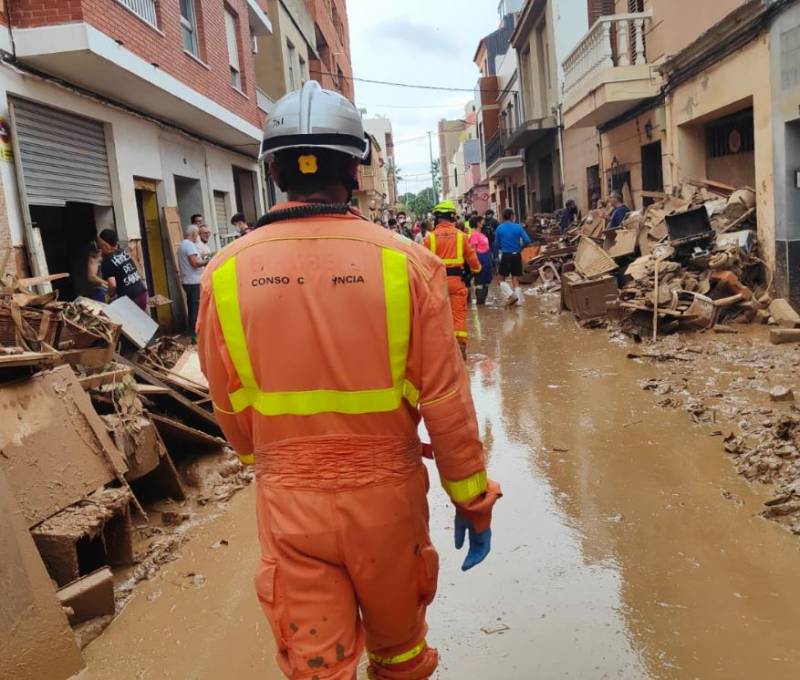
TOP STORIES: "After the storm—Here's how things stand more than a week on from the disaster" & "Will Trump's win affect people in Spain?"
The story that’s dominating Spanish and world news this week continues to be the awful tragedy that has befallen Valencia with last week’s DANA storm, and the continuing repercussions of that. Even as the rains and rescue efforts have continued, insult has been added to injury by all the politicians going around hurling blame at each other and refusing to cooperate to actually solve any problems.
And the other main story of the week was another political one – the re-election of Donald Trump to the White House. Further down we’ve got our analysis for you of what it could mean for Spain and those of us who live here.
After the storm
It’s been a week and a half since the storm began that caused such chaos in Valencia and, to a lesser degree, in other parts of Spain, and things are still nowhere near back to normal.
Over 200 people have died, but the search continues among the rubble for more bodies. There’s still not even an official count for how many people might be missing. Access roads are still closed, making it harder for rescue and aid workers to get in to the affected areas, and it could take months to get transport links fully working again. The government has promised that millions of euros of aid money will be made available to businesses and individuals, but they have to apply before the end of the year and you can bet it’ll take up to the end of 2025 to arrive.
As well as profound devastation and loss of life, the disaster has led to widespread frustration because of the perceived mishandling of the emergency response, and in the midst of it all the fake news and false accusations flying around aren’t helping anybody.
The worst affected areas, of course, were just south of the city of Valencia, in towns like Paiporta and Massanassa, while Valencia itself got off relatively lightly in comparison. Why is that? Well, historically these zones have been prone to flooding, especially due to the flat terrain and the seasonal nature of rainfall in this area. In fact, a large saltwater lagoon near Valencia has expanded significantly over time due to sporadic floods that bring in silt from surrounding riverbeds.
This process has created a natural, if alarming, pattern of periodic flooding, one that, despite its frequency, has led to little change in how urban development has been managed. Areas that were once considered too dangerous for large-scale habitation have, over the last seven decades, become densely populated, despite warnings from studies conducted as early as 2003 about the flood risks in these areas.
 Among the victims is a British couple, Terry and Don Turner, whose bodies were found after being swept away by floodwaters in Pedralba, a rural town in the Serranos region. The loss of these lives, alongside others, highlights the personal tragedies that have occurred amid the larger crisis, where whole communities have been left devastated, with homes destroyed, roads and infrastructure wrecked, and access to basic services cut off.
Among the victims is a British couple, Terry and Don Turner, whose bodies were found after being swept away by floodwaters in Pedralba, a rural town in the Serranos region. The loss of these lives, alongside others, highlights the personal tragedies that have occurred amid the larger crisis, where whole communities have been left devastated, with homes destroyed, roads and infrastructure wrecked, and access to basic services cut off.While the response from local and regional authorities has been swift in some regards, particularly in terms of the deployment of emergency teams and amateur volunteers, the official response has faced criticism for being too slow, poorly coordinated and, in the case of certain towns, entirely inadequate.
Spain’s King Felipe VI and Queen Letizia visited the affected town of Paiporta last weekend and they were met with public outrage. Protesters, including residents and volunteers, threw mud and shouted accusations at the royal family and the accompanying officials, calling them murderers and shaming them for their lack of action.
Prime Minister Pedro Sánchez and President of the Generalitat Valenciana Carlos Mazón accompanied their majesties and were similarly confronted with public reprobation; the pair had to hightail it out of their when their cars were attacked with long poles and wooden shafts.
As ever with the fake news cycle going into a death spin on the viper’s nest of a social network that is X, there were accusations that the whole affair had been orchestrated by the far right ahead of time, or that it had been a set-up by the left-wing government to try to garner pity.
In reality it was a spontaneous outpouring of public discontent, reflecting the widespread perception that the official response to the crisis has been utterly insufficient. Even with the King’s acknowledgment of the public’s anger, the tension around the government’s handling of the crisis, at both a national and regional level, remains palpable.
Critics point to the fact that, while the floods themselves were certainly devastating, the extent of the damage could have been mitigated had proper flood prevention measures been implemented earlier, particularly in the areas most affected by urban sprawl. The fact that authorities had access to maps and studies showing flood risk but allowed construction to continue since the 1950s without proper warnings or precautions is seen as a significant failure of governance.
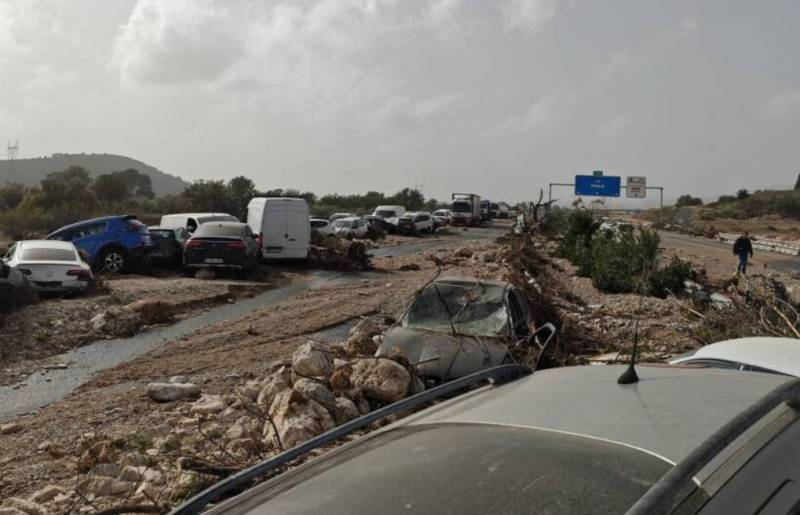
The anger towards the authorities is compounded by the lack of timely information and transparency. Many people affected by the floods were unaware that they were living in high-risk areas. For instance, the PATRICOVA maps, which provide information about flood risks, are freely available to the public but are not actively distributed or promoted to prospective homebuyers, leading to a dangerous gap in public knowledge. Such a situation has only intensified feelings of betrayal among residents, especially those who have lost everything.
Part of the reason why it has been so difficult to get help to the affected areas is the fact that the roads and transport links were effectively destroyed. Now, after more than a week of chaos, 11 of the 18 regional roads that suffered major damage have been reopened, including the CV-400 and CV-407, though significant repair challenges remain.
Seven main routes remain closed, including sections of the CV-36, CV-33, CV-309, CV-42, CV-304, CV-407 and CV-50. As for the metro/tram network, lines 4, 6, 8 & 10 should reopen this Saturday while lines 1, 2, 3, 5 & 7 are set to resume within a month. However, the lines connecting to the areas which are most heavily affected are expected to take several months to fully repair.
As emergency workers continue their search-and-rescue operations, and volunteers arrive to help clear debris and clean up, there are also growing concerns about the health risks posed by the stagnant floodwaters. Contaminated water can lead to a host of diseases, including leptospirosis, hepatitis A and gastroenteritis, all of which are particularly dangerous in the aftermath of flooding.
The Valencian regional government has taken measures to prevent a public health crisis, including the administration of tetanus vaccines and the deployment of epidemiologists to assess the situation. But as the waters recede, the risk of an epidemic looms large, especially with many areas still lacking access to clean drinking water and basic sanitation.
Once again, though, disinformation is playing a disruptive role with the usual false rumours spreading about the inefficacy of vaccines in spreading disease (something which has been scientifically disproven) or the idea that harmful substances are deliberately inserted into vaccines in order to control the populace (they don’t need to put anything in our vaccines; we’re already slaves to our mobile phone screens).
Other fake news flying around include lies that the Cruz Roja aren’t there and that there are no state troops on the ground – something which is patently false – and conspiracy theories regarding the death toll, that there are more people dead than they want to tell us about.
In the face of such confusion, clear and accurate communication is essential, yet this has often been lacking. It’s good to have a healthy dose of scepticism about what we read and hear, and a certain distrust of top-down authoritarianism is the best way to ensure the survival of the individual human spirit in the face of a tendency towards collectivisation and homogeneity. But the wilful spread of misinformation is irresponsible. There are enough bad truths out there without having to make up bad untruths. Fake news only serves to hinder community efforts to recover from the disaster.
And it’s largely communities who are pulling together to remedy the crisis. The lack of proper infrastructure and emergency preparedness has left many communities feeling abandoned by the government, but it has also sparked a tremendous outpouring of solidarity. Thousands of volunteers have arrived from across Spain to assist in the recovery efforts.
This grassroots mobilisation of volunteers, driven by a collective sense of responsibility, has been a lifeline for many affected residents. In Pedralba, for example, over 1,000 volunteers helped clear the streets, and essential aid has been pouring in from all over the country.
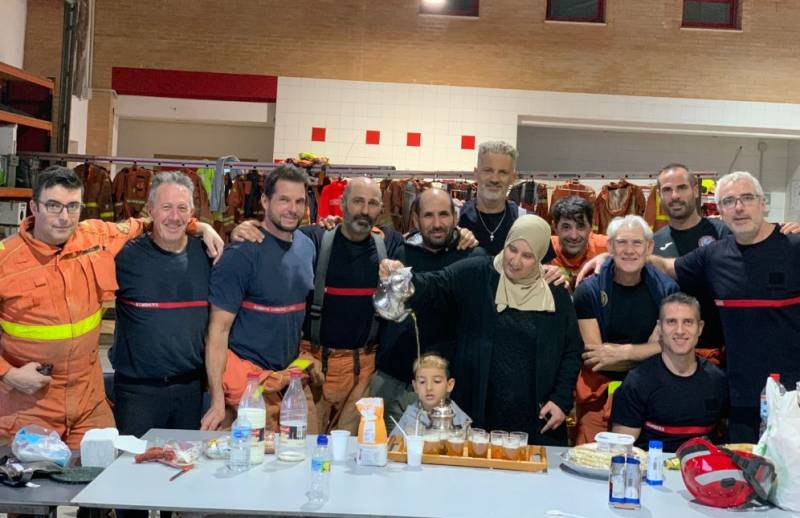
Down in the Region of Murcia, they’ve opened several collection points to gather essential supplies for those affected, with items such as water, non-perishable food and medical supplies in high demand. Areas like Águilas and Alhama de Murcia have become hubs for donations, with residents contributing much-needed goods.
Similarly, Camposol, along with nearby areas like Condado de Alhama and Hacienda del Álamo, has also rallied to provide aid, with local collection points accepting donations of baby food, medicines and personal hygiene products. The response has been swift and generous, and cash donations have been used to purchase essential goods.
In comparison with Valencia’s storm damage, the flooding that happened in Murcia last Sunday and Monday seems insignificant, but it has its own important ramifications. The storm particularly affected Mazarrón, where intense rainfall submerged roads and local residents heard their phones ping repeatedly with emergency warnings. The Las Moreras rambla rose to alarming levels, causing authorities to issue emergency alerts. The authorities closed roads, including the Vía Axial in Puerto de Mazarrón, and one car was swept away by floodwaters. Despite these challenges, no serious injuries were reported.
Other areas such as Águilas, Cartagena and Lorca also faced disruptions, with local ramblas posing a specific risk to the Mar Menor, where agriculture runoff is a concern. Monitoring was hindered slightly by a radar outage, but alternative systems ensured continued surveillance.
But what’s more worrying than this one isolated storm is the fact that, according to a recent report from the CHS local water authority, more than half a million residents in the Segura basin area, which includes large parts of Murcia, live in flood-prone areas.
According to the data, a shocking 70% of the population in the Region of Murcia resides in areas vulnerable to flooding, especially around urban centres and major watercourses like the Guadalentín River. The region is also grappling with urban expansion in these at-risk zones, and while flood-mitigation efforts are underway, there is mounting pressure for stricter planning regulations.
Ultimately, it’s going to take a combination of government money and citizen organisation to ensure that we all build a safe future together. The immediate need right now is still for rescue and recovery as the storm season continues, but in the longer term there is much work to be done, particularly in terms of rebuilding infrastructure in a sustainable way to protect from future disasters and of ensuring that those affected are not left to struggle on their own.
Your help continues to be vital. Once again, I’m leaving here a link for you with instructions on how to donate and here’s a guide specifically for how you can help animals and pets.
Orange fever
 The phrase “when the United States sneezes, the world catches a cold” was coined after the Great Depression of 1929, and it’s fair to say now that, with Donald Trump set to make his return to the White House, European leaders are bracing themselves for an epidemic.
The phrase “when the United States sneezes, the world catches a cold” was coined after the Great Depression of 1929, and it’s fair to say now that, with Donald Trump set to make his return to the White House, European leaders are bracing themselves for an epidemic.Shortly after his re-election as US President, these very leaders gathered together for a meeting to discuss how exactly this continent was going to deal with Trump, whose anti-Europe bent isn’t exactly a secret.
The minutes read like more of a motivational coaching session than an international summit, with each president and Prime Minister reassuring the group – and themselves – that Europe can withstand the storm that will undoubtedly be unleashed by Hurricane Trump.
But despite the big talk, it’s inevitable that Trump’s return to office will spell major changes in Spain and wider Europe. From trade to military aid for Ukraine, the Republican’s stance is causing major concern, especially given his well-voiced ‘America First’ approach.
One of the most immediate concerns for Spain is the prospect of returning tariffs on a wide range of imports. During his first term, Trump imposed tariffs on numerous foreign goods, and everything points to an even tougher stance on foreign spending this time around. In his campaign, Trump suggested applying tariffs as high as 10% on most imports, with a staggering 60% tax on goods coming from China. While China is the primary target, European countries – including Spain – would also bear the brunt of his protectionist stance.
In 2023, Spain ranked as the seventh-largest exporter to the United States, with key products like medicines, olive oil, refined petroleum and medical products. Last year, Spanish exports to the US totalled nearly $2 billion. The imposition of tariffs could significantly damage this trade balance, making Spanish products more expensive for US consumers and almost certainly reducing demand.
For Spanish exporters, this is a potential disaster. Olive oil, for example, is one of Spain’s top exports, and during Trump’s first presidency, the US already levied tariffs on this product. If Trump’s tariff policies are resurrected, Spain’s most successful industries – such as food, automotive and pharmaceuticals – could face stiffer competition and reduced sales in the US market, putting thousands of Spanish jobs at risk.
Beyond trade, Trump’s return to the White House could signal a shift in US foreign policy that would have serious repercussions for Spain and the broader European Union. One of the most pressing concerns is Trump’s stance on Ukraine. The businessman-turned-president has been vociferous in his opinion that monetary aid to Ukraine should be drastically scaled back, with a (disingenuous?) promise that this money would be fed back into voters’ pockets.
Trump’s stance is not only worrying for Ukraine but also for European countries like Spain, which have been staunch supporters of Ukraine’s sovereignty and the broader European security framework. His suggestion of a “quick fix” to the war through a deal with Vladimir Putin has also left many European leaders uneasy, fearing that it would grant Russia a geopolitical advantage at Ukraine’s expense.
If Trump reintroduces his ‘America First’ rhetoric, Spain and other NATO members could find themselves pressured to increase defence spending to meet a target of 2% of GDP, a requirement that many countries are already struggling to meet.
Trump’s re-election could also strengthen ultra-conservative movements in Europe, such as those led by Viktor Orbán in Hungary or Giorgia Meloni in Italy. These leaders, who share some nationalist and anti-EU stances, would be natural allies for Trump in his possible attempt to divide the European bloc to advance his own agenda.
As the world waits with bated breath to see how Trump’s re-election will play out, one thing is certain: the impact on Spain and Europe will be significant.
Will Trump’s ‘America First’ approach lead to a strengthening of US-EU relations, or will it drive a wedge between the two blocs? Only time will tell.
Murcia
From odious Americans to welcome guests… big news for music fans as it’s been revealed that absolute legend Lionel Richie is on his way to Murcia.
The smooth-voiced legend himself will grace the Plaza de Toros de Murcia on July 23, 2025, for what promises to be the ultimate summer concert. With hits like ‘Say You, Say Me, ‘Three Times a Lady’ and, of course, ‘Hello’, this isn’t just any concert – it’s practically a pop pilgrimage!
After the success of Rod Stewart, Simply Red and Tom Jones in the last couple of years, it’s no wonder tickets are flying off the shelves to go see our Lionel, so pop the date in your calendar and book your seats while you can so you can be dancing *ahem* All Night Long (but not on the ceiling because the bullring doesn’t have one…).
I can’t resist popping in a video here to a banger of a Lionel Richie song. Enjoy:
If you can’t wait until next July to go see a big-name star live in concert in Murcia, you might still be able to grab a ticket to see Bryan Adams (‘(Everything I Do) I Do It for You’, ‘Summer of ‘69’) play next Wednesday, November 13.
Talking about musical moments, Murcia’s very own Spangles Ladies’ Harmony Chorus are also setting the stage in their own way. The all-female a cappella group are in Prague this weekend for the Musica Orbis Gloria Festival, where they’re showcasing their harmonies in some of the city’s most stunning venues, including the iconic St Vitus Cathedral.
After putting Murcia on the map on their Prague adventure, the ladies will be back in time for their 20th-anniversary celebrations and a festive season packed with local performances. You can see their full schedule here, if you fancy going along to any (or all) of them.
In other earth-shaking news, another kind of rocking is happening in Mula courtesy of a little 2.2-magnitude earthquake. The tremor, which had its epicentre in Mula at 10 kilometres deep, was one of those many small quakes that leaves some residents wondering if it was a particularly large lorry passing by or something a little more seismic.
In nearby Murcia city, the façade of the iconic Cathedral of Murcia is finally scaffolding-free after a year of being covered up. This architectural masterpiece, one of Spain’s most impressive examples of the Baroque style, has been hiding under a huge tarpaulin for around 12 months now while 50 skilled artisans restored its stunning exterior.
Now, the building’s beautifully intricate façade is back on full display. The restorations, which also tackled pigeon-related wear and tear (read: poo), bring a fresh shine to the Cathedral just in time for the city’s Christmas season, which the Ayuntamiento is getting ready for already (I know).
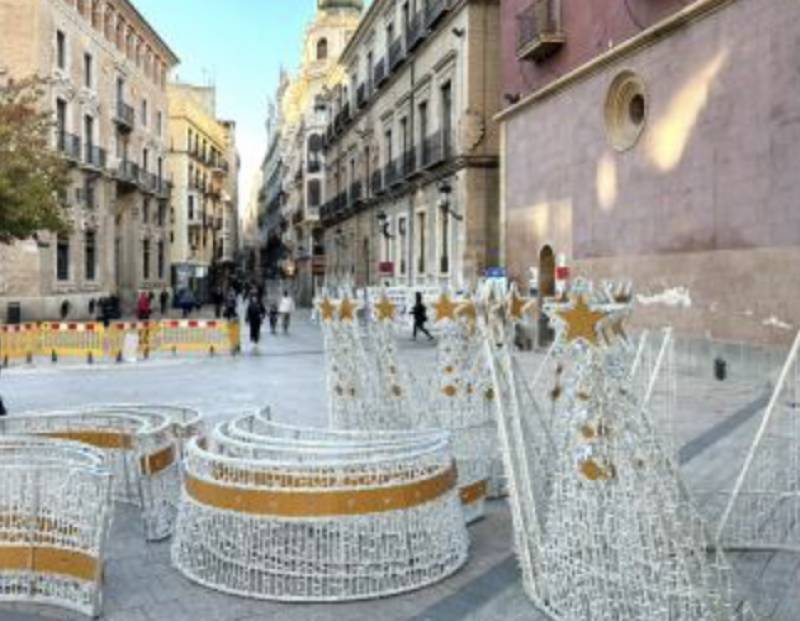 They’ve already started the long and laborious process of installing the lights in the city, but won’t turn them on until the official switch-on ceremony, which this year is programmed to take place on November 23.
They’ve already started the long and laborious process of installing the lights in the city, but won’t turn them on until the official switch-on ceremony, which this year is programmed to take place on November 23.This early start to the Christmas period follows the success of when they did the same last year, with the aim of boosting local businesses by encouraging holiday shoppers to buy more, spend more, consume, consume, consume.
As well as the general Christmas light switch-on (do you think Carlos Alcaraz will come back to do it again?), you can also look out for the main Christmas tree in Plaza Circular, due to light up on December 6, as well as Christmas markets in La Glorieta and at the Malecón. In addition, the classic Corte Inglés Christmas lights in their shop window, known as Cortylandia, returns to Murcia on November 22 after a 13-year absence, bringing some classic holiday cheer for the younger crowd and the nostalgic alike.
Looking beyond Christmas to next year, Cartagena City Council has its own plans… to build a new rubbish tip! They’re developing a new waste disposal site, or ‘ecoparque’ as they call it, in the Los Camachos Industrial Estate, near La Unión, around halfway between the Mar Menor Golf Resort and La Manga Club.
Designed to serve local communities and small businesses, this facility will collect and sort everything from green waste to electronics, metals and construction materials. It’s a necessary addition to the area, offering a place for people to dispose of various materials responsibly and efficiently, and, all being well, should be set to open early next year.
Pulling it back a bit to this weekend, but sticking in La Manga Club, a brand-new venue is opening up this Saturday. This is the Aquarium Mediterranean Restaurant & Cocktail Bar, which is having its inauguration party this Saturday evening for anyone who wants to swing by and celebrate the launch in style.
Designed for relaxed dining with an ocean-inspired vibe, Aquarium aims to be not only a place to eat and drink but will also put on events, serve as a co-working space with charging points and host its own bilingual library!
Other events coming up in the near future include the pantomime Aladdin taking place near Mazarrón this weekend, a medieval market in Cartagena on the same dates and the annual IFEPA dog show in Torre Pacheco. This weekend is also Remembrance weekend, so there is a service at the Camposol Garden of Remembrance on Sunday. And because it’s Spain, there’s always a fiesta going on somewhere; for the next week it’s the fiestas of Bolnuevo, but the big date of the week is actually the following Sunday, November 17.
Remember you can see our EVENTS DIARY for more events and activities coming up soon in the Region of Murcia:
Spain
 Rumour has it that Hollywood heartthrob Richard Gere has made his move to Spain permanent. The 75-year-old star, best known for his role in Pretty Woman, has recently made headlines for selling his stunning Connecticut mansion for $10.75 million, which marks the end of his American chapter and the beginning of an exciting new one in Europe. Might it have anything to do with that other silver fox we were talking about earlier coming back to power?
Rumour has it that Hollywood heartthrob Richard Gere has made his move to Spain permanent. The 75-year-old star, best known for his role in Pretty Woman, has recently made headlines for selling his stunning Connecticut mansion for $10.75 million, which marks the end of his American chapter and the beginning of an exciting new one in Europe. Might it have anything to do with that other silver fox we were talking about earlier coming back to power?Whatever the reason for the move, Gere and his wife, Spanish publicist Alejandra Silva, have recently purchased an 800-square-metre mansion in La Moraleja, one of the most sought-after residential areas in Madrid.
The lavish property, which cost the couple a cool 3.5 million euros, comes with a sprawling 3,000-square-metre garden, providing plenty of space for Gere, Silva and their two young children, Alexandra (5) and James (4), to enjoy the Mediterranean climate.
In an interview with Vanity Fair, Gere stated that it was only fair to allow his wife, who is 41, to be closer to her family.
“For Alejandra, it will be wonderful to be closer to her family, her lifelong friends and her culture. She was very generous in giving me six years living in my world, so it is only fair that I give her at least another six living in hers.”
“I love Spain and the ability of the Spanish people to live transmitting joy and happiness,” he added.
La Moraleja is a neighbourhood located in the municipality of Alcobendas, in the Community of Madrid, a residential area known for its luxury homes, gardens and high standard of living. La Moraleja is situated about 13 kilometres north of Madrid’s city centre and is considered one of the most affluent and exclusive areas in the Madrid metropolitan area.
Attention now all salty snack lovers: Aldi Spain has issued a recall for several varieties of potato chips after discovering the possible presence of plastic fibre fragments. The affected products include:
- Onduladas
- Onduladas sabor jamón
- Campesinas
- Al punto de sal
These crisps, sold under the Sun Snacks brand, have a best-before date between December 29, 2024 and January 20, 2025.
The German supermarket chain has warned customers that the products could pose a health risk if eaten. As a safety measure, Aldi has decided to remove all affected stock from sale and is advising customers not to consume any of the contaminated products.
If you have purchased any of these crisps, Aldi urges you to return them to the store where you bought them for a full refund.
Talking about money back, Christmas is less than seven weeks away and for many people that means it’s time to start ticking off the all-important gift list. And to kick the holiday shopping frenzy into high gear, we’ve got the consumer extravaganza that is Black Friday.
This year, Black Friday 2024 is set for Friday November 29, and it promises to bring jaw-dropping discounts on everything from cutting-edge tech gadgets to must-have fashion items and home essentials. Whether you’re hunting for the perfect gift or treating yourself to something special, Spain’s biggest sales event of the year is the place to be.
The Black Friday fun doesn’t stop on November 29. In fact, many retailers have already started stretching out their discounts to create a full-on ‘Black Week’. From Monday November 25, shoppers can start scoring deals before the big day, with discounts rolling in all week long.
 And just when you think the sales are over, Cyber Monday steps in on December 2 with even more incredible online discounts. If you’re a fan of all things tech, this is the day you’ve been waiting for.
And just when you think the sales are over, Cyber Monday steps in on December 2 with even more incredible online discounts. If you’re a fan of all things tech, this is the day you’ve been waiting for.Many e-commerce giants roll out their best tech deals and digital promotions, sometimes offering even bigger discounts than Black Friday itself. It’s a whole extra day of online shopping bliss.
But if you just can’t wait until the end of the month to bag a bargain, you might be interested to know that there’s a (kind of) brand-new shopping day that’s giving Black Friday a run for its money.
Singles’ Day originated in China as a fun celebration of single life. What started as a light-hearted celebration among university students has blossomed into one of the biggest shopping events on the global calendar.
Singles’ Day is now a full-blown shopping phenomenon, and November 11 is the day to watch. In fact, Singles’ Day 2021 tripled Black Friday’s sales figures in both the US and Europe.
Major retailers like AliExpress, Alibaba, Shein, Huawei and Temu are jumping on the bandwagon, offering incredible deals that rival those of Black Friday.
From Black Friday’s massive discounts to Cyber Monday’s tech deals and the global frenzy of Singles’ Day, November 2024 is shaping up to be the ultimate month for shopping. Whether you’re in the market for gifts, gadgets or just a little treat for yourself, now is the time to grab the best offers before they’re gone.
Alicante
Now, with the festive season just around the corner, residents of Orihuela Costa can’t help but feel like they’ve been handed a lump of coal in their stockings. For years, this popular coastal community has been neglected when it comes to infrastructure and municipal funding, and unfortunately, it looks like this year will be no different.
 While there have been a few token gestures to get into the Christmas spirit – like relocating Santa’s village to the coast and putting up a municipal Nativity scene in Playa Flamenca – locals are far from impressed. Many feel that the holiday cheer is being overshadowed by a stark disparity in how the local government allocates its budget, with the coastal area getting far less than its fair share.
While there have been a few token gestures to get into the Christmas spirit – like relocating Santa’s village to the coast and putting up a municipal Nativity scene in Playa Flamenca – locals are far from impressed. Many feel that the holiday cheer is being overshadowed by a stark disparity in how the local government allocates its budget, with the coastal area getting far less than its fair share.The Unidos por la Costa association is raising the alarm, pointing out the glaring inequalities between Orihuela City and the coast when it comes to holiday funding. According to their calculations, a whopping 79% of the 793,672-euro Christmas budget is being funnelled into the city centre, with 630,000 euros going to activities there.
In contrast, Orihuela Costa is left with just 163,000 euros, or a mere 21% of the total budget.
Sadly, this neglect is nothing new. After a round of budget cuts in 2023, the Christmas activities along the coast were lacklustre at best. The much-anticipated Santa Claus parade was a letdown, with cheap-looking floats and costumes that were already falling apart. And in recent years, the festive lights in popular tourist spots like La Zenia and Cabo Roig have been anything but spectacular.
Now, as we approach Christmas 2024, it looks like Orihuela Costa is in for more of the same.
While Orihuela city is getting 245,400 euros for festive lighting, the coast will receive just 61,867 euros – a far cry from what’s needed to light up the area properly.
Similarly, the city’s parade is allocated a generous 154,940 euros, while the coast’s parade budget is just a fraction of that at 52,756 euros. As for street activities, the city is getting a whopping 134,310 euros, while Orihuela Costa gets nothing at all.
And this isn’t just about Christmas. Looking ahead to 2025, the coast seems to be left out in the cold once more. Despite contributing a significant portion of the region’s income – at least half of the municipal budget’s revenue comes from taxes paid by the residents of Orihuela Costa – the area continues to receive inadequate services and infrastructure in return.
Residents are fed up with promises that never seem to materialise. Even though the new government has been in power for over a year and a half, there have been few improvements to show for it.
For now, it looks like Orihuela Costa’s residents will have to wait yet another year for the level of investment and attention they deserve.
As the peak season for flu and other respiratory illnesses approaches, health experts are urging residents of Alicante to act now and get vaccinated. With the season expected to last until February or March, getting the flu and Covid vaccines as soon as possible is crucial.
It takes around two weeks for your body to develop antibodies after being vaccinated, so now is the perfect time to roll up your sleeve and protect yourself.
Alicante local health authorities have launched a mobile vaccination centre that will be making stops across the province this month, making it easier than ever for residents to get their shots.
The mobile vaccination centre, which was initially set to begin on November 3 but was delayed due to the DANA storm, will now hit the road on Saturday November 9, in Alicante’s Plaza de España, right across from the bullring.
From there, it will head to Elche on Sunday November 10, where it will be parked on the Paseo de Jaca, opposite the Altamira Palace. The centre will be open from 10am to 2pm.
No appointment is necessary; just walk in and get vaccinated on the spot.
In the coming days, Spain’s Ministry of Health will announce the schedule for additional visits to Torrevieja, Benidorm and Alcoy. Keep an eye out for more information about when the mobile vaccination unit will be in your area.
The 2024/2025 vaccination campaign officially began on October 14, starting with vaccines for the elderly and those in residential care. Since November 4, flu and Covid vaccinations have been made available to everyone, with residents encouraged to book an appointment at their local medical centre.
Finally, you can get ready for five days of unforgettable fun as the Benidorm Festival (Festes Majors Patronals) takes over the city from November 9 to 14. One of the most anticipated events in Benidorm’s lively calendar, the festival is a unique blend of religious tradition and unbridled excitement, making it a must-see celebration for locals and tourists alike.
Music lovers will be treated to some fantastic live shows throughout the festival. On Monday November 11, Carlos Baute, one of Spain’s most beloved pop stars, will perform at Plaza de SS.MM. Los Reyes de España. At the same time, the Marlene Orchestra will bring their energetic sound to Hort de Colón, ensuring a night filled with top-tier music and entertainment.
But the real showstopper of this year’s festival is undoubtedly the Fancy Dress Party, one of the most exciting events on Benidorm’s social calendar. Set to take place on Thursday November 14, the party will transform the streets of Rincón de Loix into a riot of colour, creativity and celebration.

More than 30 elaborate floats will parade through the streets, accompanied by dance troupes, percussion bands and a vibrant crowd of partygoers.
Expect to see outlandish costumes, jaw-dropping performances and an atmosphere of pure joy as locals and tourists come together for a night of non-stop revelry.
For other events and activities happening in the area, check out the What’s On page of Alicante Today or join the Costa Blanca What’s On and Where to Go Facebook group
Andalucía
Málaga is no stranger to the tug-of-war between local residents and the booming tourism industry, and it seems that the city is getting ready to dig its heels in for the long haul.
To curb the spread of holiday rentals that are squeezing out permanent housing, Málaga city council has drawn up a bold new plan. As of last week, the city has mapped out zones to rein in new licences for tourist accommodation across 43 of its neighbourhoods. Under this new regulation, tourist properties have been categorised into three zones, each with its own limitations on short-term rentals.
The so-called ‘decreasing zone’ includes places like the historic centre, La Merced and El Ejido, where tourist properties already make up over 8% of all housing, meaning new licences will be off-limits. It’s all part of an effort to preserve the character and liveability of these areas, and while new registrations are banned in these 43 neighbourhoods, in the ‘restricted growth zone’ (32 neighbourhoods), only those rentals with separate entrances can open up, limited to an 8% cap.
The idea is that, hopefully, these restrictions will temper soaring rental prices for residents while allowing the city to remain a top travel destination.
But just because there’s a crackdown on holiday homes doesn’t mean the province has gone cold on tourism. Quite the opposite as Málaga is rolling out the red carpet for chocolate enthusiasts this weekend.
The International Chocolate Fair, Chocomad, is set to hit Alhaurín de la Torre with three days of non-stop cocoa creativity this Friday, Saturday and Sunday. Visitors can immerse themselves in all things chocolate, from tastings and demos to chocolate-themed events.
There are more than 60 exhibitors lined up to showcase everything from artisanal chocolates to the finest international cocoas. For five euros (or less for children and seniors), you can indulge in sweet delights, watch master chocolatiers at work and maybe even try your hand at chocolate pairings with craft beers, wines and even cheeses.
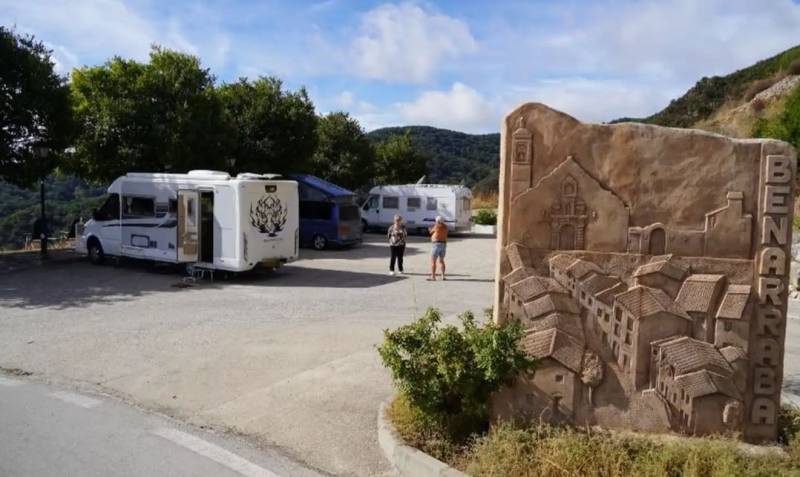 Meanwhile, another Málaga towns is attracting a different kind of tourist. Benarrabá, a tiny municipality in the west of Málaga province, is seeing an influx of visitors in the form of motorhomes.
Meanwhile, another Málaga towns is attracting a different kind of tourist. Benarrabá, a tiny municipality in the west of Málaga province, is seeing an influx of visitors in the form of motorhomes.Each year, this charming little town with just over 550 residents welcomes around 3,000 campers and caravanners, effectively septupling the population. They’re mainly drawn in by the scenic Genal Valley and the town’s excellent motorhome facilities, including ample parking in specially created motorhome areas and electrical hook-ups.
Definitely one to look up if you’re a caravan enthusiast, and there’s loads of good hiking and nature tourism to enjoy around there, but if you’re not up for travelling on wheels, how about by air? Well, Andalucía has even more travel options lined up with new flight routes planned from the UK and Europe over the next couple of years.
British airline Jet2 is launching new routes between Jerez (Cádiz) and Leeds, Birmingham and Manchester in 2025, with plans to add London and Bristol connections by 2026.
Not to be outdone, Almería will also add new direct flight paths to Morocco and Budapest in 2025, and they say they are also strengthening ties with other European markets like Iceland and Luxembourg, though details on that front were hazier.
If you’re planning to visit Almería some time soon and want a mix of adventure, relaxation and natural beauty, you could do worse than a trip to San Juan de los Terreros. It’s a beach town positioned right in the spot where Andalucía meets Murcia, and it offers everything from pristine sandy beaches (still a nice time of year for it right now!) to volcanic islets and snorkelling (maybe only for the brave or the Nordic at this time of year).
One of the best things about San Juan is probably the historical sites and its stunning natural formations. There are great hiking trails up to the castle, for example, and of course the famous Pulpí Geode, Europe’s largest geode, lined with crystals and only a short trek from town up in the mines, which themselves have a fascinating history. Highly recommendable for a guided tour if you’ve never been.
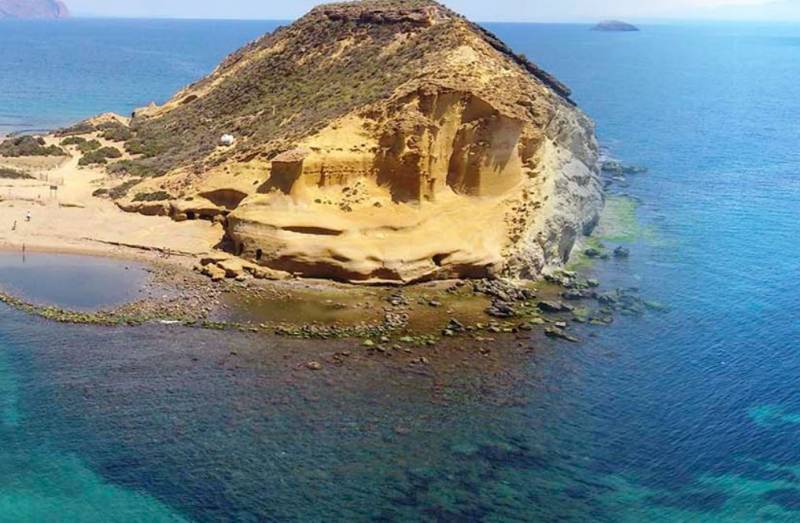
You may have missed…
- Non-resident property owners in Spain: Don’t miss these key deadlines in December!
There are important tax deadlines non-resident property owners in Spain should know about before the end of this year; if you own a holiday or second home in Spain and use it for personal use or rent it out, it’s crucial to file your Modelo 210 tax returns correctly and on time! - Everything you need to know about the Horizontal Property Law in Spain and Community of Owners.
Whether you live in Spain full time or just visit to your holiday home, whether your property is on an urbanisation or in an apartment building, you need to know about the Horizontal Property Law. It regulates the rights and obligations of homeowners in the community and what the Community of Owners can and cannot do—pretty much everything for co-living in harmony is already down in legal writing in Spain and it helps to be aware of it. - 2024 will be the warmest year to date, marking a new milestone in the record books.
2024 will almost certainly be the warmest year on record and the first to exceed the 1.5°C barrier above pre-industrial level for the year. - Brits now account for almost half of all overnight stays in Benidorm.
Benidorm is once again proving itself as a top destination for British tourists, with UK visitors now accounting for a staggering 45% of the city’s overnight stays. - Spain grants double parental leave to single parents.
In a landmark decision, Spain’s Constitutional Court (TC) has ruled that single parents are entitled to the same parental leave benefits as couples, effectively doubling the amount of time a single parent can take off work after the birth of a child.
That’s it for another week. Remember this Sunday is Remembrance Sunday, when it is customary to observe a minute’s silence for the war fallen.
See you next week
Contact Murcia Today: Editorial 000 000 000 /
Office 000 000 000



















